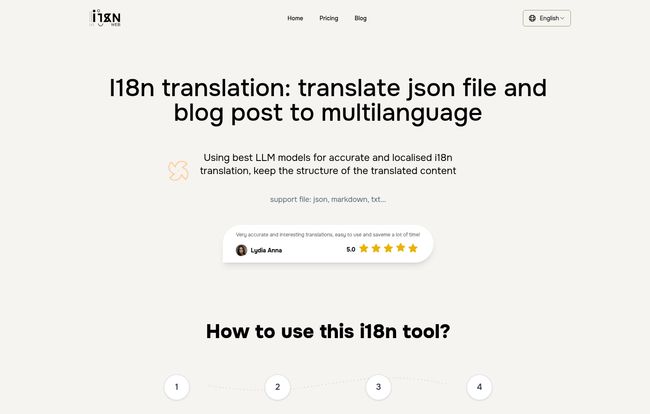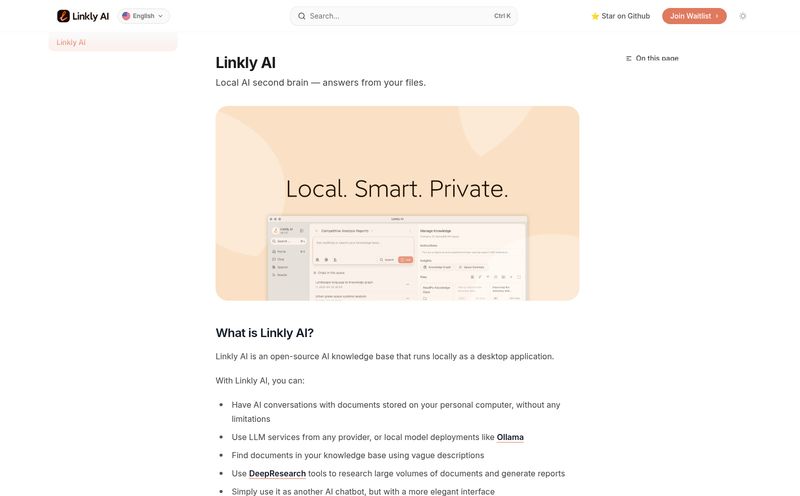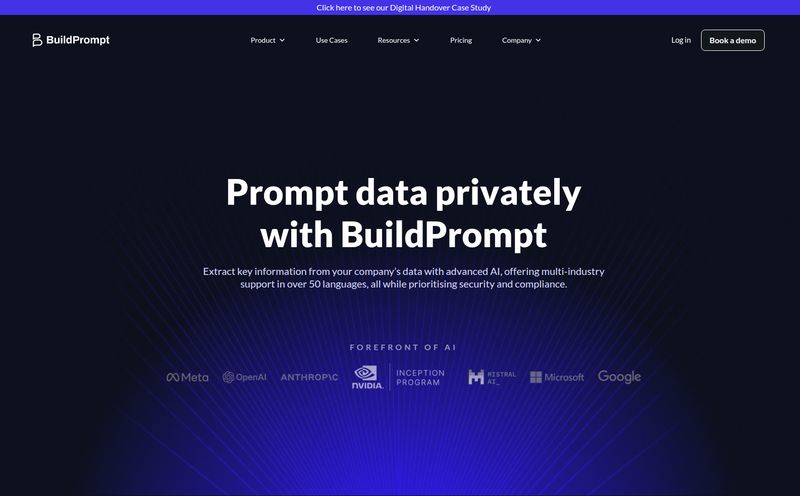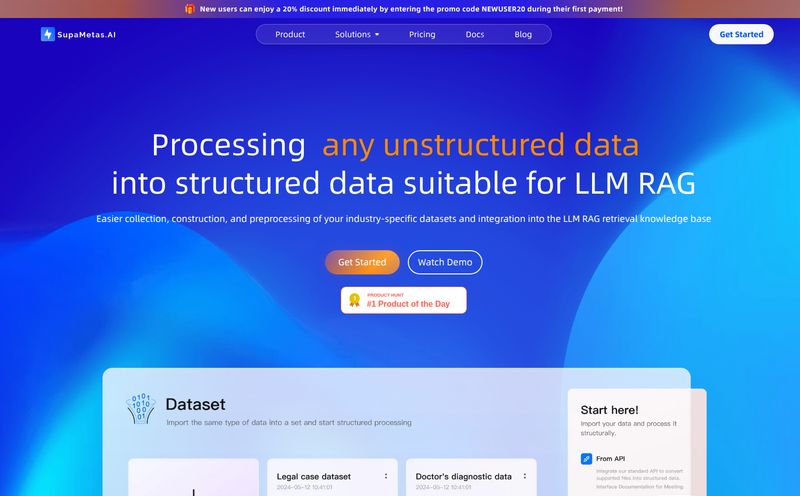If you're a developer or a content manager who's ever had to deal with internationalization (or i18n, for the cool kids), you know the pain. The eternal, soul-crushing pain of translating a JSON file. You send it off, you get it back, and... boom. A missing comma. A quote mark replaced with its fancy curly cousin. The entire app crashes. All because you wanted to say "Hello" in German.
It’s a nightmare. A real, syntax-error-at-3-am nightmare. For years, we’ve cobbled together scripts or painstakingly copy-pasted values into generic translation tools, praying we didn’t miss a closing bracket. It’s tedious, it's error-prone, and honestly, it’s a terrible use of a developer's time. So when I stumbled upon a tool called i18n Web that claimed to solve this exact problem using LLMs, my cynical-veteran-blogger senses started tingling. I had to take it for a spin.
So, What Exactly is i18n Web?
At its heart, i18n Web is a specialized translator. But don't just lump it in with the Google Translates of the world. Think of it less like a sledgehammer for all language and more like a surgeon's scalpel for very specific file types. It’s built from the ground up to handle JSON, Markdown, and TXT files. You know, the stuff that actually powers our websites, apps, and documentation.
The big promise here is that it uses modern Large Language Models (LLMs) to not only translate the text but also to understand and preserve the file's structure. This means it's supposed to know the difference between a string value that needs translating and a key that absolutely must not be touched. A pretty bold claim, if you ask me.
My First Impressions: The User Experience
Hopping onto their site, the first thing I noticed was the clean, almost minimalist interface. No fluff, no crazy animations. It just gets straight to the point. The whole process is broken down into four simple steps:
- Upload Your File: A simple drag-and-drop box. You can toss your JSON or Markdown file right in.
- Select Languages and Translate: Pick your target languages. You can do multiple at once, which is a nice touch.
- Check or Edit: This is a godsend. It shows you the translated output in an editor before you download, so you can make quick fixes or sanity checks.
- Download: Grab your perfectly structured, translated files.
It's refreshingly straightforward. I didn't need to read a 20-page doc or watch a webinar to get started. I just uploaded a test JSON file, and it worked.

Visit i18n Web
The Good, The Bad, and The Nitty-Gritty
Of course, no tool is perfect. After playing around with a few different files, a clearer picture started to form. It’s not just about what it does, but how it does it, and what the trade-offs are.
What I Really Liked About i18n Web
The structure preservation is, without a doubt, the killer feature. I threw a moderately complex JSON file at it, with nested objects and arrays, and it came back flawless. All the brackets, commas, and quotes were exactly where they should be. That alone is worth its weight in gold.
The translation quality is also a step above what you’d get from a basic API. Because its using an LLM, it seems to grasp context better. The translations felt more like a human had written them, not just a word-for-word swap. They call it "localized" translation, and for once, that marketing speak feels earned. Another fantastic little feature is the ability to specify JSON keys to skip during translation. This is huge for configuration files where you might have things like `"theme_color": "blue"` or `"api_endpoint": "/users"` that should never, ever be translated.
A Few Things to Keep in Mind
Now for the reality check. The free tier is generous for a quick test, but it has its limits. You’re capped at 2 files and 2 languages per translation, with limits on file size (about 30 key-value pairs for JSON). And there's a waiting queue for the translation to process. It's the classic "freemium" model—a great taste, but you'll need to pay if you're even slightly serious.
One interesting note in their FAQ is that sensitive content might get blanked out in the output. This is likely a precaution built into the underlying LLM to prevent it from handling PII or other confidential info. It's a double-edged sword: good for security, but something to be aware of if your content files contain user details or other sensitive strings. You'll want to check your output carefully.
Let's Talk Money: i18n Web Pricing
The pricing structure is pretty clear, which I appreciate. It's not one of those "Contact Us for a Quote" black boxes. They have a few tiers that cater to different needs.
| Plan | Price | Who It's For |
|---|---|---|
| Free | $0 | Perfect for testing the waters or for a tiny personal project. You get the core functionality but with file size/number limits and a wait time. |
| Basic | $7.90 / month | The solo dev or small startup plan. You get 30 credits, which they say is good for a few JSON files or articles. Crucially, you get to skip the waiting queue. |
| Pro | $29.90 / month | For agencies, businesses, or anyone doing frequent translations. You get a hefty 250 credits, support for more files and all languages, higher character limits, and your translated files are saved for 15 days. |
Honestly, the pricing seems pretty fair. The Basic plan, at less than the cost of two fancy coffees a month, feels like a no-brainer if you find yourself fighting with JSON files more than once a month. It buys you back time and sanity, and what's the ROI on that?
So, Who Is This Tool Actually For?
This isn't a tool for your grandma to translate a recipe. This is purpose-built for a specific crowd:
- Web and App Developers: Anyone working with frameworks like React, Vue, Angular, etc., that rely on JSON files for internationalization will feel right at home.
- Technical Writers: If you're maintaining documentation in Markdown and need to support multiple languages, this could save you countless hours.
- Content & Marketing Teams: Especially those working with headless CMSs where content snippets are often stored as JSON objects.
It occupies a really interesting middle ground. It's more powerful and specialized than a general-purpose tool like DeepL but far less complex and expensive than an enterprise-grade localization platform like Lokalise. It’s for the teams and individuals who need to get the job done right without a massive overhead.
The Final Verdict on i18n Web
I went in skeptical, and I came out a fan. i18n Web isn't trying to be everything to everyone. It's a tool that solves a very specific, very annoying problem, and it does it well. It removes the most frustrating and error-prone part of translating developer-centric files—the risk of breaking the structure.
Is it going to replace a full-scale localization team for a massive corporation? Probably not. But for the solo developer, the startup, the agency, or the content team that just wants to launch in a new language without pulling their hair out? Yeah. It’s a game-changer. It's one of those simple, effective tools that makes you wonder how you ever put up with the old way of doing things.
Frequently Asked Questions
Can i18n Web translate any file type?
No, it's specifically designed for file types that have a defined structure and are common in web development and content management. Currently, it supports JSON, Markdown (.md), and plain text (.txt) files.
Is the free version of i18n Web good enough for a real project?
It depends on the scale. For a very small personal project with one or two small files, it might work. However, the limits on file size, number of files, and the waiting queue for translations mean that for any professional or time-sensitive work, you'll likely want to consider one of the paid plans.
How does i18n Web handle localization vs. just translation?
It uses Large Language Models (LLMs) which are trained on vast amounts of text. This allows the tool to understand the context and nuance of a phrase, leading to more natural, localized translations rather than a simple, literal word-for-word swap that often sounds robotic or incorrect.
What happens if I go over my monthly credit limit on a paid plan?
The provided information suggests a monthly credit allotment (30 for Basic, 250 for Pro). If you exceed this, you would likely need to wait until your credits reset the next month or upgrade your plan to continue translating larger volumes of content.
Do I need to be a developer to use i18n Web?
Not at all! While the files it translates (like JSON) are used by developers, the tool's interface itself is very user-friendly. If you know how to drag and drop a file, you can use i18n Web. It's great for project managers or content creators who manage these files but don't write the code themselves.



